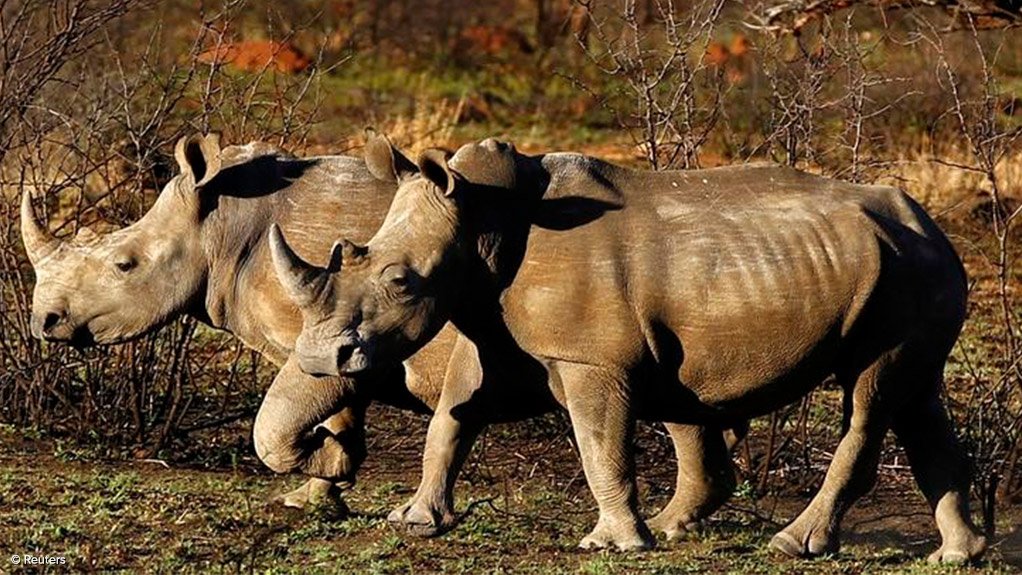Ahead of World Rhino Day, a new ENACT pilot study on organised wildlife crime has revealed that the number of poaching incidents in Southern Africa has tripled since 2010.
ENACT is a pan-African programme which works to mitigate the impact of transnational organised crime (TOC) in Africa on development, governance, security and the rule of law.
ENACT is implemented by a partnership of organisations, including the Institute for Security Studies and Interpol, in affiliation with the Global Initiative against Transnational Organised Crime.
ENACT researcher Ciara Aucoin said on Thursday at an ENACT seminar, to commemorate World Rhino Day, that the illicit trade in wildlife was a serious conservation issue and that it had important social impacts.
Poachers of endangered species often benefit from moving their illicit harvest along the networks of criminal syndicates, which traffic deadly arms and drugs.
ENACT’s research shows that most poaching occurs in South Africa, followed by Namibia and Zimbabwe, where poachers are increasingly poisoning their prey with cyanide. The top non-African destinations for wildlife products are China, Hong Kong and Vietnam.
ENACT is pioneering a new approach to monitoring transnational organised crime in Africa – including wildlife crime – using a methodology first developed to track armed conflict and global terrorism. It will generate new data and analysis to contribute towards more effective policies and law enforcement.
ENACT has noted that it is difficult to establish clear behaviour patterns as a result of gaps in data recording and reporting.
“Syndicates operate in more than one sector. The trade in wildlife products like rhino horn, pangolin and lion bones supports a supply of guns and drugs and contributes to challenges of corruption at multiple levels,” said Aucoin.
South African National Parks head of special projects Major-General Johan Jooste said the human cost of wildlife crime was immense.
“Poaching can drive away tourism, the economic engine of areas like the Lowveld [in Mpumalanga]. Pockets within local communities are criminalised; the same communities where many rangers and their families live,” he explained.
The seminar revealed that while rhino horn was especially lucrative, many other wildlife products, including elephant ivory, abalone and animal pelts were also traded.
It was also revealed that wildlife crime was the fourth most lucrative organised crime globally and one of the most expensive security challenges facing Southern Africa.
While the true value of wildlife crime was difficult to ascertain, estimates were as high as R299-billion a year, according to US-based nonprofit organisation Global Financial Integrity.
South Africa spends R200-million a year and employs nearly 450 rangers just to protect the Kruger National Park, a magnet for tourists who marvel at one of Africa’s best preserved wilderness areas.
According to the wildlife trade monitoring network TRAFFIC, only five tonnes of the estimated 37 tonnes of rhino horn poached between 2010 and 2016 were seized by law enforcement agencies.
Swiss-based Small Arms Survey senior researcher Khristopher Carlson said that United Nations Comtrade data revealed that the import of hunting rifles into Mozambique from 2010 to 2015 increased at a similar rate as poaching in the Kruger Park.
“A correlation between the two trends, warrants closer inspection. There’s enough evidence to suggest that there’s something suspicious going on there,” stated Carlson.
ENACT head Eric Pelser argued that combating wildlife crime must remain a priority.
“We need to pay more attention to the aspects of wildlife crime that are harder to measure, such as the drivers of demand and how poachers and smugglers are recruited. Better understanding leads to better tactics. We can’t afford to get it wrong anymore,” he expressed.
With regard to South Africa, EU Ambassador to South Africa Dr Marcus Cornaro noted that with 79% of the world's African rhinos found in South Africa, it was critical that South Africa fight against poaching and get involved with efforts to address the trafficking of rhino horn and related criminal activities.
“Unambiguous legislation, persistent law enforcement and coordinated action along the entire wildlife trafficking ‘value chain’ – including tackling demand – are crucial elements in combating this organised crime and ensuring sustainability. Importantly, combating wildlife trafficking also requires that local communities in and around protected areas are involved,” Cornaro said.
Current strategies to save Africa’s wildlife include developing militarised anti-poaching methods, working with communities surrounding wildlife areas, and disrupting the sophisticated networks that recruit poachers from local communities.
Syndicates have stayed ahead of the law by bribing officials and exploiting weak law enforcement on the long borders between Southern Africa’s richest wildlife reserves.
“We know Africa’s wildlife heritage is being destroyed and we need more information on how to stop this,” Pelser pointed out.
He added that ENACT’s approach emphasises that strategy needs to be built on a better understanding of the problem, from the push and pull factors that attract poachers, to the tactics of big money syndicates.
It was also suggested that South Africa’s ability to monitor and disrupt wildlife crime was also an indicator of its ability to deal with other important challenges, from land ownership to corruption.
“Losing this battle is not just about the wildlife, it would also mean we have lost our ability to combat crime, monitor our borders, give rural people a stake in the economy, and stop the plundering of resources,” Aucoin said.
EMAIL THIS ARTICLE SAVE THIS ARTICLE ARTICLE ENQUIRY
To subscribe email subscriptions@creamermedia.co.za or click here
To advertise email advertising@creamermedia.co.za or click here











